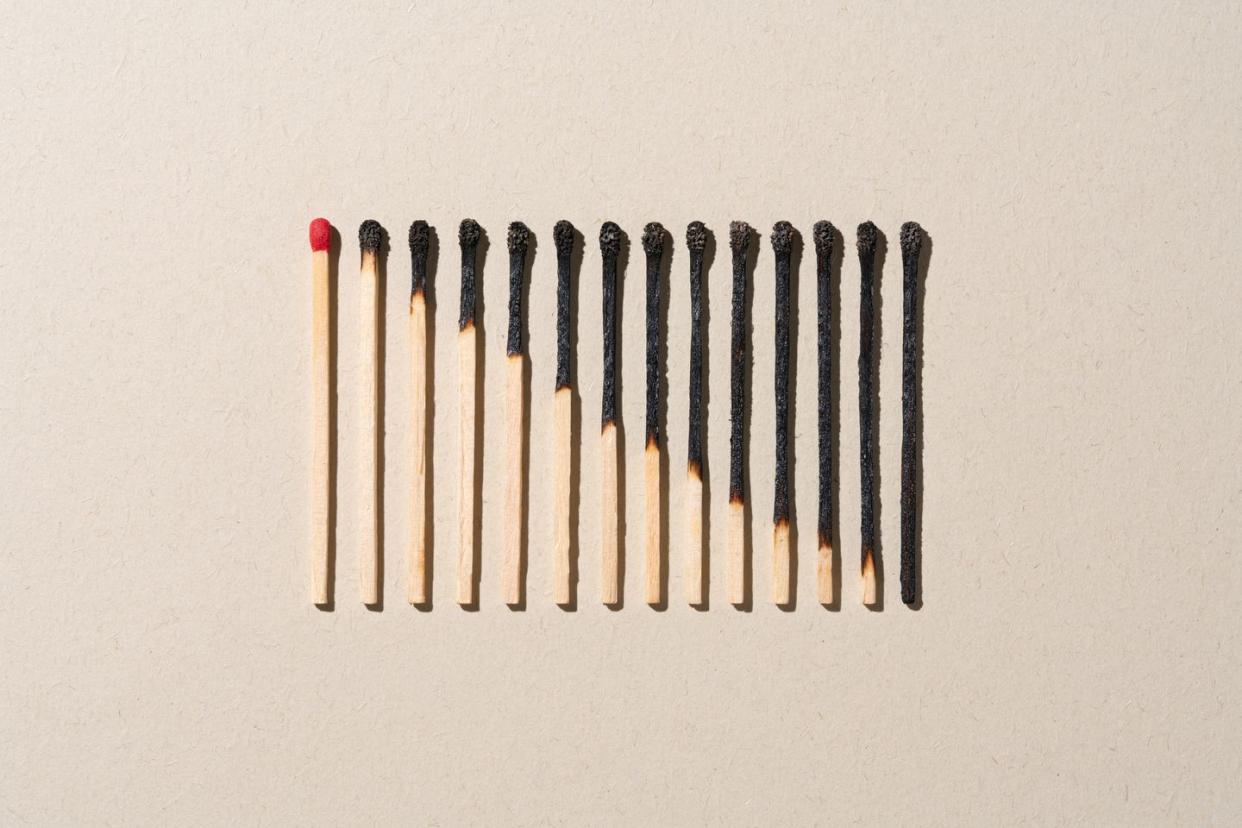The Right Way to Ask Your Boss for a Mental Health Day

"Hearst Magazines and Yahoo may earn commission or revenue on some items through these links."
Life comes at you fast. But in the last couple of decades, the speed of life has accelerated, and it yanks at your attention through your phone, email and too much urgent-feeling media being shared and shared again. Work is demanding, the world is chaotic, your kids are fighting over who gets “the best” color M&Ms and you dream you hear work notifications in your sleep. If you can fall asleep.
Um, someone needs a mental health day, like, yesterday.
What is a “mental health day”?
A "mental health day" simply means a day that you use to de-stress, get away from all the demands on your time and psyche, and re-center yourself so you can feel better and function well in the world and at work. “The best reason to take a mental health day is for the prevention of burnout, as opposed to when you’re already burnt out,” says Rosenna Bakari, Ph.D., a psychologist and author of The Healing Journey who also consults on workplace wellness. “If that happens, then you need more than a mental health day,” she says.
It's called a mental health day because you use it specifically to attend to your mental health, and to make sure your feelings of stress and anxiety do not cross over into a truly debilitating crisis. While stress itself is not a mental illness, 76% of respondents in an American Psychological Association (APA) poll said that stress negatively impacted their lives, and 36% of those said it harmed their mental health.
What’s more, people who reported a high level of overall stress were far more likely to feel depressed or anxious (57% ad 56% respectively) than those living lower-stress lives (10%). “Psychological research on both humans and nonhuman animals revealed that the effects of stress on the brain, immune system, our gene expression, susceptibility to physical illness, mental illness and subsequently on people’s ability to engage in necessary daily tasks can be long-lasting, and even intergenerational,” the authors wrote.
One thing to bear in mind: Although we all need to tend to our mental health, not everyone has a mental illness. The use of the term “mental health day” may seem trivializing to those dealing with issues that go far beyond stress and overwork, says Vanessa Kelly, a labor and employment attorney at Clark, Hill in New York City. A more accurate way to refer to it might be a "Self-Care Day," or a “Day to De-stress.”

A person with a mental illness such as clinical depression, says Kelly, “may be treating with multiple health care providers, taking medication and still it is a struggle to get out of bed that day, put clothes on, drive to work, interact with others and use the mental labor of getting work done,” she says. “And they do this day in and day out because they have a disability yet need to earn a living. How might this person feel when someone without these struggles blithely announces, “Wow, I need a mental health day! I am feeling stressed.”
Signs you need to take a day off
You’re the best judge of when you feel so unraveled that a good night’s sleep or a weekend isn’t enough to set you right. And if you’re a parent or caregiver — perhaps to your own aging parents — a weekend might simply be another workday. “What’s making you feel like this doesn’t necessarily have anything to do with work, but it follows you into the workplace,” says Bakari. And keep in mind that if you’re a full-time parent, your workplace is your home, and you may still need a day off to take care of yourself.
Below, some signs that you’re due for a self-care day (in no particular order):
You’re exhausted or falling asleep at work
You are irritable and short-tempered when you’re not normally
You feel cynical or apathetic
You generally like what you do, yet you dread going in
You’re showing up late more than you used to
You’re extra sad, stressed or anxious
You’re not getting enough done or your pace has slowed down
You are headachy or have other physical symptoms of stress like stomach problems or muscle tension
You have trouble concentrating
How to talk to your boss about taking a day off from work
If you have the kind of supervisor who you know trusts you to get your work done, and you know to value mental health, you may well be able to confide in them about taking a mental health day.
But there’s zero obligation to disclose why you need a day off, even if you’re friendly with your boss, says Bakari, and some supervisors don’t want to know what you do with your time off. “If you have a reasonable person, you might want to tell them, but whether they do or not [approve of mental health days] you still get to take care of yourself.”
Regardless, how you bring it up needing a day off depends on your style, what your boss is like, what the rules are in your workplace and whether you get paid time off or sick days. According to a 2023 survey by the APA, only 40% of respondents said that they feel their employer has a culture that respects mental health, and only 15% they work somewhere that offers mental health days specifically.
“Most states do not require an employer to provide any paid time off, even for sick leaves,” says Kelly. Clearly, if your job does not offer you time off or sick days, taking a day to de-stress would be unpaid, and you would be under no obligation to explain to your boss why you are taking the time off.
Most employers do, however, offer paid days off, at least to full-time employees, and some are specifically designated as sick days; others simply give paid time off and leave it to the employee as to how they want to use it, she says.
The best and least awkward way to take a de-stress day, if you don’t care to confide in your boss about how you’re feeling, is simply to use a personal day or one of your vacation days — not a sick day, advises Kelly. That’s because in some states, it is legal for your boss to require that you bring a doctor’s note for a sick day and this is a way around it.
Is it ever okay to take a sick day for mental health?
To be clear, if you have a mental illness, your employer cannot legally discriminate against you for that or any other disability, according to the Equal Employment Opportunity Commission. Neither is your boss entitled to ask about your condition, except in certain narrow circumstances.
If you are otherwise well, but need a day off to re-center yourself so you feel less stressed or fried, that gets trickier. The same goes for if you don’t have any paid time off, but you do have sick time, and need a day to care for yourself? You may legit feel that your stress level is so high that it’s making you feel sick — or that you’re afraid it will if you don’t get a break. Is it okay to use a sick day for a day to tend to your mental health, if you don't have an “official” illness?
Bakari says yes — if you’re doing so in good faith, and not if you stayed out too late the night before and don't feel like heading in. “I think the bottom line is that we want people to take care of themselves, we know that most people leave their jobs with sick days on the table. You get to define what those terms are for you,” she says. “What’s important, though, is that we are talking about responsible human beings here,” not people who are trying to get over. Ideally, she says, you try and schedule it for a lull period.
What to do on your de-stress day
This may seem obvious — do whatever you find relaxing, such as staying in bed reading or taking a yoga class — but there are some things to keep in mind, says Bakari.
Spend time alone or on something just for you — only that will leave you feeling truly refreshed. A parent who takes a de-stress day might think, now I can give the babysitter a day off and hang out with my toddler. Unless you find that truly and deeply relaxing, give the sitter a day off when you don’t need one so desperately yourself. “If you do some things for other people, just make sure you spend time on yourself,” says Bakari.
Keep your de-stressing activity health-promoting. “I think the worst thing is staying at home and being inebriated all day,” she says. “People do it!” That may feel relaxing at the moment, but “you’re not going to be ready to go back. If you take this day, and you come back and still grumpy and underproducing, then it didn’t help,” she says.
It’s okay to play catchup — a little. Sometimes the reason we feel overwhelmed and stressed is because the pace of our work life doesn’t allow us to do the things (such as laundry or doing research on summer camps for your kids) that keep our home life on track. So it’s fine if you do some things that have been hanging over your head and will make you feel better about going back to work. “If that alleviates the stress, if that means you’re not at work all day thinking of how take care of children’s needs, that can work,” says Bakari. “But if you’re gonna take the time off, you need to be getting some peace in there for yourself. It’s not about taking care of everyone else.”
Bottom line: You’re not weak or a slacker if you take a day off when you’re not physically ill or going on vacation. “The whole point is for you to recenter yourself, so that you can continue to serve,” says Bakari. “It’s important to be able to do that without guilt. You can’t feel guilty for taking care of yourself."
You Might Also Like
